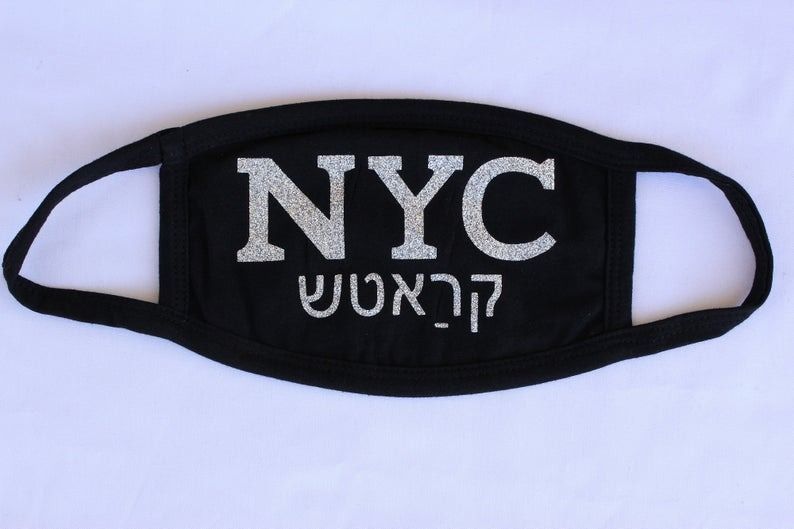NYC crotch
« previous post | next post »
News you can use, from The Forward: "Etsy vendor who doesn’t know Yiddish accidentally sells 'NYC crotch' face mask" (Aiden Pink, May 26, 2020).
A vendor on the e-commerce site Etsy wanted to sell facemasks that said “NYC Strong” in Yiddish – but the final product said “NYC Crotch” instead.
The vendor Tees Go Bling, based in Wyoming, offers dozens of glittery facemask designs for sale, including images of the American flag and the Disney logo, as well as slogans of support for various cities like “Detroit Strong” and “Chicago Strong.”
The trouble began when they tried to sell a “NYC Strong” mask using the Yiddish word for strong, shtark. But while Yiddish is written right-to-left, like Hebrew, the Yiddish letters in shtark [שטאַרק] were printed left-to-right [קראַטש], meaning that anyone looking at it the correct way would read shtark backwards – as “crotch.”
The Forward reports that the proprietor of the Etsy shop, who is named Sue, initially took down the listing for the mask after she was alerted to the error, but then she reinstated it after people wanted to buy it anyway.
“I was stunned by the demand over something that is spelled wrong!!!” she wrote. “My family had a good laugh over it and I thought, ‘I will never add anything up again in a language I am unfamiliar with. LOL!!’”
The “NYC Crotch” mask is available for $15 plus shipping costs on Etsy, with four mask colors and 17 different glitter variations.
Sue fell prey to an extremely common error in reproducing right-to-left scripts, notably Arabic and Hebrew. If a word or phrase in one of these languages is copied from some online source, it can sometimes get flipped to read left-to-right when transferring the text to another program. (Various older versions of Microsoft Word have had this issue.) In the case of Arabic, along with getting reversed, letters also appear in their unconnected forms, instead of the typical rendering with initial, medial, and final forms in connected script. (Hebrew also has some letters that have different forms in word-final position.)
Back in 2016, when the first trailer for the movie "Arrival" was released, I posted about some Arabic that unfortunately got flipped in what was meant to show an international news alert about the aliens' arrival ("Language is messy, part 2: Arabic script in 'Arrival'"). The intended Arabic, أخبار عاجلة akhbār ʿājila 'breaking news, news flash,' was instead rendered as ة ل ج ا ع ر ا ب خ أ . After the post was published, the filmmakers must have been alerted to the error, since subsequent trailers for the film had the Arabic spelled correctly.
In the 2016 post, I gave various other examples of this type of Arabic misrendering, and it's not hard to find Hebrew-script examples as well. In fact, sometimes Arabic and Hebrew can both appear in reversed form on the same sign. Last year, Jeffrey Schwartz noted this well-meaning signage on the newly opened Hudson Yards development in Manhattan:
On the sign, Hebrew שלום shalom appears as םולש (molash?), while Arabic مرحبا marḥaban is printed in unconnected L-to-R letters as ا ب ح ر م . As with the "Arrival" trailer, the goof was quickly fixed — once alerted to the problem on Twitter, Hudson Yards apologized and promised to replace the sign with a corrected one.
In the case of the "NYC crotch" masks, however, Etsy buyers have deemed the error simply too delightful to correct.
(For more on the "[Place Name] Strong" template that was intended for the Etsy mask, see my 2013 Boston Globe column and follow-up Word Routes column.)


Gene said,
May 26, 2020 @ 3:49 pm
Maybe they can resale the mask at the Y
Mike K said,
May 26, 2020 @ 3:51 pm
Final M ם in Hebrew looks a lot like S ס which makes me read what's written as "solesh", which isn't but should be a word. SLš is not a semitic root afaik, but it's pretty close :)
Yuval Pinter said,
May 26, 2020 @ 5:44 pm
There is a third source of mischief at play here, although mildly: the diacritic appears under the wrong letter.
Yiddish uses aleph-with-patach-underneath as its /a/ vowel, and that's where it should be. Since the copy-paste error must have treated the patach as an individual character, it rendered it underneath the resh instead, which isn't a cromulent Yiddish spelling as far as I'm aware, but actually works well (if creating some redundancy) in Hebrew.
David L. Gold said,
May 26, 2020 @ 7:51 pm
@Yuval. "underneath the resh instead, which isn't a cromulent Yiddish spelling as far as I'm aware."
You are right. The diacritic, whether a pasekh or a komets, goes under the alef:
אַ
אָ
Gregory Kusnick said,
May 26, 2020 @ 11:02 pm
The first time my wife left a black cloth facemask hanging over the bathroom towel rod, I said "That looks like elf underwear." I'm glad to be finally vindicated.
J.W. Brewer said,
May 27, 2020 @ 8:46 am
The odds that a randomly-chosen word in a given language will, if spelled backwards, yield another intelligible word presumably vary quite a bit from language to language, depending on the language's phonotactic constraints, orthographic conventions, and the interaction between the two. Not sure if anyone has ever tried to study or model that systematically.
J.W. Brewer said,
May 27, 2020 @ 11:20 am
I am advised by a literate-in-Arabic friend that some well-meaning U.S. jurisdiction put out an Arabic translation of its information about COVID-19 that did the whole separating-characters-and-putting-them-backwards thing, with the result that the most obvious transliteration back into our own alphabet (or at least a defensible transliteration, given the whole issue of vowels not mapping one-to-one very well) was arguably DAFUQ-19.
Leo said,
May 27, 2020 @ 2:29 pm
So to bilingual readers of Yiddish and English, kratsh looks like crotch? I would never have got the joke. To me, kratsh – which I take to be the English transliteration of what's on the mask – doesn't evoke anything.
Adam F said,
May 28, 2020 @ 3:57 am
That's hilarious — at least it's not someone's tattoo.
@J.W.Brewer: out of curiosity, I did quick check in Python from a flat file of the English Scrabble list (which does include a lot of "weird" words).
Total words: 270,162
Palindromes: 153
Words that reverse to other words: 1658 (i.e., 829 pairs) so about 0.6% of the list
Coby Lubliner said,
May 28, 2020 @ 11:15 am
@Leo: I wouldn't be surprised if Yiddish-speakers in New York took kratsh to mean 'crotch', if the very anglicized Yiddish spoken in the TV series "Unorthdox" is any indication.
Leo said,
May 28, 2020 @ 12:00 pm
@Cory Lubliner: It might be a US/UK difference. In my UK English kratsh looks like it should have the "trap" vowel, but I can imagine it having "palm" in US English.
Leo said,
May 28, 2020 @ 1:14 pm
@Cory Lubliner: I very much enjoyed watching "Unorthodox" recently. It was fascinating to hear Yiddish, a language which I believe my great-great-grandfather spoke. Anglicised or not, I could not have understood a word without subtitles, and my German A-Level was only helpful in retroactively mapping the English translations onto what I had just heard.